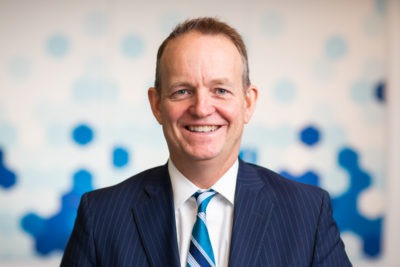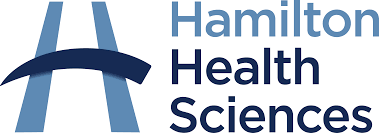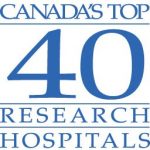About
Research is a fundamental part of what we do at Hamilton Health Sciences. In partnership with McMaster University, we have a decades-long track record of making discoveries that change how healthcare is delivered around the world.
Our culture of exploration and innovation has attracted top research talent from across Canada and beyond, and we’re consistently ranked among the country’s Top 40 Research Hospitals.
Learn more about research at Hamilton Health Sciences through various webpages that showcase our Institutes, Expertise, Collaborations, and Innovation activities .
2023-24 Research Impact Report

Advancing Research Together: 2023-24 HHS Research Impact Report
The 2023-24 HHS Research Impact Report highlights some of the remarkable discoveries and achievements by HHS researchers from the past year, and also provides insight into the direction HHS is taking to advance our research.
Research and Innovation Leadership

Dr. Jeschke has world-renowned expertise in the field of translational research. He is a research leader with a proven ability to attract funding and grants from various national programs and agencies to advance innovative medical care in burns. Under his direction since 2010, the Ross Tilley Burn Centre (RTBC) at Sunnybrook Health Sciences Centre became a leading surgical and burn care institution in North America. Prior to being the Director of the RTBC, Dr. Jeschke held faculty positions at the University of Texas Medical Branch and Shriners Hospital for Children. There, in addition to his work as a surgeon, he coordinated research activities with a focus on increasing productivity and obtaining grants. Dr. Jeschke became an MD in Germany, moved to the United States and obtained a Master of Medical Science degree at the University of Texas, then returned to Germany to complete his PhD (Habilitation) in Experimental Surgery at the University of Regensburg in Bavaria.

Ted Scott brings resources, partnerships and thought leadership to healthcare innovation. He is Chair of the Synapse Life Sciences Consortium in Hamilton, and was previously Chief Innovation Officer and Dean of Applied Research at Mohawk College, where he studied Radiography and Sonography. Scott is an expert digital health strategist and has a wealth of experience in industry relations and procurement, as well as innovation policy. He returned to HHS where he started his career as a sonographer after working at The Hospital for Sick Children and Huntsville District Memorial Hospital. Ted is a lifelong learner who earned his Masters of Applied Science in Medical Ultrasound and his PhD in Diagnostic Imaging from Charles Sturt University of Australia.
Dr. Jeschke has world-renowned expertise in the field of translational research. He is a research leader with a proven ability to attract funding and grants from various national programs and agencies to advance innovative medical care in burns. Under his direction since 2010, the Ross Tilley Burn Centre (RTBC) at Sunnybrook Health Sciences Centre became a leading surgical and burn care institution in North America. Prior to being the Director of the RTBC, Dr. Jeschke held faculty positions at the University of Texas Medical Branch and Shriners Hospital for Children. There, in addition to his work as a surgeon, he coordinated research activities with a focus on increasing productivity and obtaining grants. Dr. Jeschke became an MD in Germany, moved to the United States and obtained a Master of Medical Science degree at the University of Texas, then returned to Germany to complete his PhD (Habilitation) in Experimental Surgery at the University of Regensburg in Bavaria.
Ted Scott brings resources, partnerships and thought leadership to healthcare innovation. He is Chair of the Synapse Life Sciences Consortium in Hamilton, and was previously Chief Innovation Officer and Dean of Applied Research at Mohawk College, where he studied Radiography and Sonography. Scott is an expert digital health strategist and has a wealth of experience in industry relations and procurement, as well as innovation policy. He returned to HHS where he started his career as a sonographer after working at The Hospital for Sick Children and Huntsville District Memorial Hospital. Ted is a lifelong learner who earned his Masters of Applied Science in Medical Ultrasound and his PhD in Diagnostic Imaging from Charles Sturt University of Australia.
Reports and Publications
Read the latest reports and publications about research at Hamilton Health Sciences:
Advancing Research Together: 2023-24 HHS Research Impact Report
Research Spotlight — Summer 2024 – Seniors month
Research Spotlight — Spring 2024 – Cancer research
Research Spotlight — Winter 2023 – Children’s, women’s and family health
Research Spotlight – October 2023 – HHS research awareness month
Research Spotlight – July 2023 – A focus on collaboration
Research Spotlight – May 2023 – Innovation amongst HHS researchers
Research Spotlight – March 2023 – Highlighting women in research at HHS
A hospital without walls – Innovations transforming healthcare – April 2019
In the Spirit of Research: What If?
Best Scientists in Medicine 2024
We are pleased to share the recent list of Best Scientists in Medicine 2024 and highlight the 45 researchers on the list who are affiliated with Hamilton Health Sciences (HHS) and our academic partner, McMaster University.
Congratulations to these researchers for making an impact and contributing to a culture of research and innovation at HHS:
Sonia S. Anand
Shrikant I. Bangdiwala
Mohit Bhandari
Jackie Bosch
Dina Brooks
Ronald D. Barr
Anthony K.C. Chan
David A. Clark
Stephen M. Collins
Stuart J. Connolly
Mark Crowther
Judah A. Denburg
Philip J. Devereaux
John W. Eikelboom
Hertzel C. Gerstein
Gordon H. Guyatt
Robert G. Hart
R. Brian Haynes
Jeff S. Healey
Jack Hirsh
Manel Jordana
Marc G. Jeschke
John G. Kelton
Mark Levine
Mark Loeb
Eva Lonn
Maureen O. Meade
Shamir R. Mehta
Paul Moayyedi
Paul M. O’Byrne
Alexandra Papaioannou
Guillaume Paré
Stuart M. Phillips
Gregory R. Pond
Peter Rosenbaum
Saroj Saigal
Holger J. Schünemann
Sam Schulman
Gregory R. Steinberg
Koon K. Teo
Mark A. Tarnopolsky
Theodore E. Warkentin
Jeffrey I. Weitz
Timothy J. Whelan
Salim Yusuf
Our Institutes
Research at Hamilton Health Sciences happens across our many programs and services, and on varying scales. Much of our research is led by our five specialized research institutes. Together, they conduct research that advances patient care by bringing evidence into practice through translation and application in to real-world environments.
At Hamilton Health Sciences, our research happens in real-time at the bedsides of our patients and across our many programs and services. That research is supported by world-class infrastructure, including Canada’s largest biobank and a family of research institutes, each with expertise in a unique area which, collectively, cover the spectrum of health and disease. All of our research institutes are operated in partnership with McMaster University. Click on the images below to learn more.
Learn more about Hamilton Health Sciences’ research institutes below.
Centre for Burn Research
The Centre for Burn Research conducts research focusing on developing treatments and therapies to improve improve outcomes for burn patients. Our leadership has over 25 years of experience in burn care and research and has helped to develop other leading burn centres around Canada. Our goal is to improve survival and quality of life through high-quality, evidence-based care.
Population Health Research Institute
A world leader in large clinical trials and population studies, Population Health Research Institute (PHRI) is Canada’s premier cardiovascular research institute. World-class researchers conduct some of the largest studies in the world, spanning all frontiers of the globe and covering a broad spectrum of health-related issues. PHRI’s population science focus examines biological and genetic determinants, as well as social, environmental and policy factors, with an emphasis on risk factors and the prevention of heart attacks, stroke, diabetes, kidney disease and cognitive decline. PHRI has conducted more than 80 global trials and epidemiological studies in more than 1,500 centres, in 86 countries, in all inhabited continents.
Visit the PHRI website to learn more.
Escarpment Cancer Research Institute
The Escarpment Cancer Research Institute (ECRI) is focused on improving care for cancer patients by focusing on three thematic areas: clinical trials, quality health care and knowledge translation research, and transitional (bench-to-bedside) research. ECRI brings together successful, well-established teams with newly formed cancer research groups in order to embrace and create new opportunities for synergies in research.
Visit the ECRI website to learn more.
Thrombosis and Atherosclerosis Research Institute
The primary focus of the Thrombosis & Atherosclerosis Research Institute (TaARI) is research excellence in thrombosis and atherosclerosis. TaARI’s core research programs include the Experimental Thrombosis and Atherosclerosis Program, the Clinical Thromboembolism Program, the Biometrics Group, and the Comparative Medicine Program which focuses on the translation of basic research findings into clinically relevant models prior to evaluation in humans.
Visit the TaARI website to learn more.
Offord Centre for Child Studies
Research conducted at the Offord Centre has had an important impact in Ontario, in Canada, and internationally. It is commonly stated that one in five children in Canada have a mental health challenge. That statistic comes from the Offord Centre’s 1983 landmark study, The Ontario Child Health Study, one of the most important population-based studies on children’s mental health conducted anywhere in the last 30 years.
Visit the Offord Centre website to learn more.
GERAS Centre for Aging Research
The GERAS Centre is committed to educating and empowering seniors to regain and retain independence and to manage their health through active participation in their care. These new models of care engage family members and build capacity for support within the community. The experts at St. Peter’s Hospital are also dedicated to advancing healthcare education for the present and next generation of healthcare professionals. Through innovative research the GERAS Centre aims to close the gap between knowing and doing to contribute to improved quality of life for seniors.
Visit the GERAS Centre website to learn more.
Clinical Research Library and Biobank
The Clinical Research Laboratory and Biobank (CRLB) is a state-of-the-art research facility which provides comprehensive Central Laboratory services to support global clinical studies and innovative research. The facility has the capacity to accommodate 100 large storage tanks, each holding approximately 80,000 vials. Samples in the Biobank are linked to relevant clinical information relating to diabetes, obesity, cardiovascular disease, hypertension, stroke, kidney disease, fractures and cancer. It is the largest research biobank in Canada, with several million samples from around the world which support on-going research at Hamilton Health Sciences.
Visit the CRLB website to learn more.
Our Expertise
Hamilton Health Sciences’ Research Administration team is available to support the needs of the hospital’s research community by offering expertise in the following areas:
- clinical contracts and agreements
- clinical research ethics
- development and relations
- financial services
- infrastructure support/resources
- internal funding opportunities
Collaboration
We welcome opportunities to collaborate with fellow healthcare institutions and providers, research centres, and other industries on comprehensive research studies and trials that align to Hamilton Health Sciences’ research programs and vision.
Find more information about how to collaborate with us on research initiatives below.
Youth Outreach Programs
Hamilton Health Sciences has two highly sought-after Youth Outreach Programs designed to mentor the next generation.
Discovery Days In Health Sciences: A one-day symposium for Ontario high school students in grades 10-12 who are considering a career in Health Sciences.
High School Research Bursary: Designed for senior high school students interested in pursuing, or accepted into, university or college level post-secondary studies in Health or Life Sciences.
Capabilities
Hamilton Health Sciences has multiple clinical sites and a rich, collaborative research network. This has helped to accelerate the knowledge transfer process and ensure best proven practices for healthcare delivery.
Covering a broad spectrum of health research, HHS investigators explore basic laboratory, clinical and epidemiological research. Strict guidelines and policies combined with a sophisticated infrastructure support system ensure the highest level of data integrity, adherence to national and international regulations, and timely reports. Our teams provide start to completion expertise, including:
- Conceptual development & protocol
- Study design and set-up, data management, statistical analysis
- Study initiation, site selection, recruitment, regulatory approval
- Study maintenance: ongoing monitoring, study close-out, data analysis, central laboratory analysis, presentation of final results
- Publication and dissemination of study results
- Regulatory submissions, clinical trial reports
Contract Policies
Hamilton Health Sciences protects you and your patients with the following:
Legally-binding agreements
Confidentiality agreements, clinical trial agreements, site agreements, amendments, grant agreements, memorandum of understanding, data sharing agreements, material transfer agreements.
Internal Policies
The research contracts team ensures our internal policies on research, publication, intellectual property, insurance, etc. are followed.
CAHO – The Council of Academic Hospitals of Ontario
We base our clinical trial agreements on the CAHO Statement of Principles. In fact, we were on the CAHO Steering Committee that developed these principles.
CAHO Harmonization of Clinical Study Agreements Initiative
In an effort to reduce timelines and promote transparency in contract negotiation, HHS has adopted the document developed through an initiative of Council of Academic Hospitals of Ontario (CAHO) and entitled “Statement of Principles to be Considered when Negotiating a Clinical Studies Agreement” which can be accessed on the CAHO website, or is available for download here. HHS encourages companies to review and incorporate these principles into its clinical study agreement templates prior to entering into negotiations with us. If any of the items in the principles document are issues of concern, please do not hesitate to contact the Research Contracts Team to discuss them.
Contact Us
To learn more about collaborative opportunities with Hamilton Health Sciences Research, contact us:
293 Wellington St. N., Suite 120
Hamilton, ON
Internal Funding
**These funding opportunities are limited to Hamilton Health Sciences Researchers which includes McMaster University faculty members who must have a formal cross appointment with Hamilton Health Sciences (this excludes DRIVE)**
Hamilton Health Sciences (HHS) takes a strategic approach in developing internal funding programs for its research community, including front-line staff. HHS invests approximately $1.6 million dollars annually to provide operating grants, career awards, and travel awards, as well as mentorship opportunities through two province-wide youth outreach programs. Funding and mentoring programs are awarded through peer-review competitions designed to support every career stage, from senior investigators with established, large-scale research studies, to early-career investigators initiating their first research study.
HHS Strategy Resource Documents:
HHS Corporate Strategic Plan
HHS Digital Health Plan
HHS People Plan
Planning Our Healthy Future
HHS DRIVE - SPARK Funding Competition
The 2024 SPARK Funding Competition is now open!
HHS DRIVE is proud to offer the SPARK funding for operationalizing innovation and commercialization. The award is intended to support any Hamilton Health Science employee with costs towards advancing the conceptualization, development and/or commercialization of their innovative healthcare-related idea or solution. Two awardees will be funded up to $50,000 per year to demonstrate tangible advancements towards their solutions.
Learn more about DRIVE and submit an Expression of Interest (EOI) to begin your application process.
Research Bridge or Match Funding
Hamilton Health Sciences (HHS) commitment to exemplify diversity and support the development, growth and sustainability of research work undertaken by HHS investigators has led to establishing a new Bridge or Match Funding Program with specific intention to:
- Assist investigators whose grant applications have not been successful, having a close score to fundable level, on a recent peer-review grant to any national granting agency and who demonstrate a need for Bridge funding.
- Assist investigators who require an Institutional Match Commitment for external granting agency funding.
Funding Allocation
Subject to availability of funding, HHS Research will allocate at total of $300,000 annually – $150,000 for each competition round. Each project may be awarded a maximum of $50,000. The number of applications funded will depend on the quality and number of applications received, as well as amount requested by each applicant.
For more information and details, please reference the Guidelines for Application and Application Form provided below as hyperlinks. Only one application submission per Principal Investigator for each competition will be considered.
Important Dates – Submit applications to: researchnetwork@hhsc.ca
Spring Competition Deadline: May 15th
Fall Competition Deadline: November 15th
Important Forms
Mentorship Opportunities
Mentoring Opportunities for Youth
Mentorship opportunities are available through two highly successful youth programs designed to expose young people to a career in Health and Life Sciences. Programs invite province-wide participation, attracting students from greater-Hamilton, the golden horseshoe and the south-west and north-east regions of southern Ontario.
High School Health Research Bursary Awards
Work placement: July 2, 2024 to August 16, 2024
Mentor application deadline: March 15, 2024
Hamilton Health Sciences has been offering this program since 2004 that connects Ontario’s top science students with Hamilton Researchers and their teams over a 7-week summer internship placement. The program is designed to expose high-school students to a career in health research by providing hands-on experience in a research environment. To date, 131 of the 207 past participants have pursued a career in Health or Life Sciences and many are building a career in research with funding and publishing opportunities.
While student’s gain invaluable experience, often described as ‘life-changing’, the benefit to mentors and their research teams are many, including skilled summer students (screened and funded by HHS) to work on research projects. Once exposed to the experience, most mentors support the program annually, and many have provided additional placements and training to returning students – up to and including graduate training!
This mentorship opportunity is open to all HHS researchers from all HHS Sites and McMaster University.
2024 High School Health Research Bursary – Mentor Application
For more information, contact Donna Catherwood, at catherwood@hhsc.ca.
If you are a student, please visit the Student Information page.
Discovery Days Symposium
Event: May 30, 2024
Mentor workshop submission deadline: April 15, 2024
A symposium attracting students from high schools across Ontario, Discovery Days in Health Sciences is designed for student’s grades 9 – 11 considering a career in life or health sciences. Students benefit from an inspiring keynote lecture, and morning and afternoon interactive workshops of their choice. Mentors develop and present demonstrations and provide hands-on interactive workshops focusing on their area of expertise. Members from all areas of the research community are invited to participate, which include: basic & clinical researchers, research fellows, nurses, allied health professionals, clinical research coordinators, graduate & undergraduate students, residents, lab technicians, etc. Workshop submission details are available at: https://www.cdnmedhall.org/hhsvirtual
For more information, contact Donna Catherwood, at catherwood@hhsc.ca.
Discovery Days is a joint effort between HHS Research Administration and the Canadian Medical Hall of Fame (London, Ontario).


